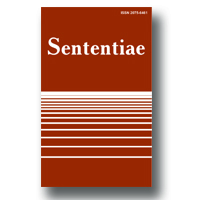|
2.
|
Sententiae:
Volume >
28 >
Issue: 1
Іван Іващенко
Ivan Ivashchenko
Асиметричність Тотожності. Міркування Щодо Кантової Трансцендентальної Дедукції
Asymmetry of the identity. Reflections on Kant’s transcendental deduction
abstract |
view |
rights & permissions
| cited by
The object of the paper is to consider the potential of Kant’s transcendental argument in re-lation to Ernst Tugendhat’s “symmetry argument”. The point of Tugendhat’s argument is the hypothesis that the relevant epistemic use of the first person singular pronoun in the sentence with the structure like “I know that I φ” (where φ stands for various states of mind) makes sense only when someone else can use this sentence by replacing “I φ” with “he φ”, meaning “me” from the first person perspective. Tugendhat calls this basic principle “veritative sym-metry”. Hence, Tugendhat assumes that self-consciousness can be described in terms of ob-ject-knowledge. At this juncture several problems loom large. For one thing, an immediate consequence of such assumption is reification of self-knowledge due to the demand to assign it to some object (state of mind). Also we cannot explain both a meaningful usage of the first-person pronoun and the link between object knowledge and second level (higher-order) self-knowledge, which we have to reach observing some mental states.
The object of the paper is to consider the potential of Kant’s transcendental argument in re-lation to Ernst Tugendhat’s “symmetry argument”. The point of Tugendhat’s argument is the hypothesis that the relevant epistemic use of the first person singular pronoun in the sentence with the structure like “I know that I φ” (where φ stands for various states of mind) makes sense only when someone else can use this sentence by replacing “I φ” with “he φ”, meaning “me” from the first person perspective. Tugendhat calls this basic principle “veritative sym-metry”. Hence, Tugendhat assumes that self-consciousness can be described in terms of ob-ject-knowledge. At this juncture several problems loom large. For one thing, an immediate consequence of such assumption is reification of self-knowledge due to the demand to assign it to some object (state of mind). Also we cannot explain both a meaningful usage of the first-person pronoun and the link between object knowledge and second level (higher-order) self-knowledge, which we have to reach observing some mental states.
|
|
|
3.
|
Sententiae:
Volume >
28 >
Issue: 1
Віталій Терлецький
Vitali Terletsky
Прелімінарії До Поняття Онтології В Критичній Філософії Канта
Preliminary to Concept of the Ontology in Kant’s Critical Philosophy
abstract |
view |
rights & permissions
| cited by
Basing on Kant’s vast oeuvre, which includes not only published works, but also corre-spondence, lectures and handwritten heritage, the paper explains the meaning of the concept “ontology” in relation to the evolution of the philosopher’s thoughts. An analysis of Kant’s relevant word-usage shows that in the period of criticism he is inclined to adapt traditional metaphysica generalis in the frame of a new project of transcendental philosophy. However, at the same time, certain ways and contexts of usage of the ontological vocabulary remain inher-ited from the German metaphysical school, which is especially evident in the concept of «on-tological proof».
Basing on Kant’s vast oeuvre, which includes not only published works, but also corre-spondence, lectures and handwritten heritage, the paper explains the meaning of the concept “ontology” in relation to the evolution of the philosopher’s thoughts. An analysis of Kant’s relevant word-usage shows that in the period of criticism he is inclined to adapt traditional metaphysica generalis in the frame of a new project of transcendental philosophy. However, at the same time, certain ways and contexts of usage of the ontological vocabulary remain inher-ited from the German metaphysical school, which is especially evident in the concept of «on-tological proof».
|
|
